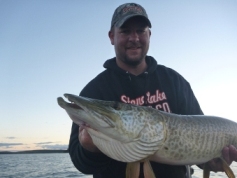|
|
Posts: 227
Location: New Brighton, MN | I heard a local radio advertisement today on a very popular twin cities station, selling chemicals used to kill lake weeds. It was a pretty aggressive ad, and it really raised my curiousity on how this affects water quality for fish, not humans.
I thought about contacting the company, but I'm sure they're responses would be quite biased.
Does anyone have experience with private chemical treatment of weeds? How does this effect the health of fish? Does it require a permit? is it even possible to effect weed growth without constant poisoning?
I guess im just afraid this practice is a destruction of vital fish habitat, and the way it is being advertised on the radio is misleading and dangerous.
I have no authority to determine if these chemicals are good or bad for overall water quality. I am hoping someone here can... ?
Thanks,
Willis
|
|
| |
|

Posts: 214
Location: Central Iowa | I'm no expert on chemicals but i've use Ktea which is a weed killer in one of my farm ponds for the last 6 years and its still the best bass pond i've ever fished so i'd assume it does not hurt the fish as advertised. There are instructions on how to apply it so as not to harm the fish because it reduces the oxygen level, it is to be applied around the perimeter of the pond and you are suppose to start up against shore and work you way out so that you do not trap fish in the treated area. I have noticed while applying the chemical that all the fish hiding in the weeds will bolt out to open water. |
|
| |
|
Posts: 584
| Willis:
Years ago while I was in college, I had a summer job working for a company in the twin cities doing weed treatments in lakes. Probably the same company that you are hearing advertised.
There is a permitting process that the company has to go through, and there are guidelines for the types and amounts of chemical that can be used. Also, I had to study for and pass a test to become licensed as an aquatic herbicide applicator. Not rocket science or anything, but it involved some studying in order to pass.
The chemicals that are being used shouldn't harm fish, but could cause some problems for people if they are directly exposed. We placed warning signs along the landowner's shoreline indicating that they shouldn't go into the water for the first 24 hours after the application....the chemicals could result in a skin rash.
Overall, my recollection is that the weed treatments were not very successful. Most applications would result in a temporary thinning of most weed species. (Part of the service offered by the company was a "re-treatment" two weeks after the initial treatment, if the shoreline owner was dissatisfied....as I recall, nearly all customers needed a "re-treat" because there wasn't much affect). Milfoil in particular was/is very difficult to control. |
|
| |
|

Posts: 299
Location: Nowheresville, MN | I heard the commercial and all I could do was shake my head. It was written in an extremely biased manner and borderline incorrect. It also gave the fale pretense that anyone can buy the stuff and start blasting away in lakes...wrong. Permits are needed and the surface area that can be applied can vary. You should contact the company because the worst part about it was they said something to the effect that "weeds" don't provide any good to lakes. This is false and therefore is false advertising. |
|
| |
|

Posts: 284
Location: Fishing the weeds | They treat our area lakes on a regular basis. What I have noticed is, poor water clarity and oxygen levels all summer long and, the dead weeds provide fertilizer to next seasons crop. Then we have the weed harvesters that not only cut the weeds in the lake but also pick up fish and, especially the fry that are using the weeds for survival. But they continue to say that it helps the lake and that the muskies and walleye are to blame for poor fishing. |
|
| |
 killing lake weeds chemically
killing lake weeds chemically killing lake weeds chemically
killing lake weeds chemically